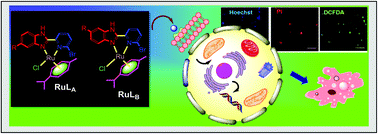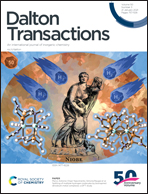DNA targeting half sandwich Ru(ii)-p-cymene-N^N complexes as cancer cell imaging and terminating agents: influence of regioisomers in cytotoxicity†
Abstract
For diagnosing and annihilating cancer in the human body, herein, we have adopted a one pot convenient synthetic protocol to synthesize a library of half sandwich Ru(II)-p-cymene-N^N complexes under continuous sonication and isolated their regioisomers by preparative thin layer chromatography followed by justification of stability using DFT. The present work has resulted in a library of ruthenium arene complexes and their isolated regioisomers following environmentally benign green processes and their screening of anticancer activity in terms of cytotoxicity and selectivity against cancer cell lines where [(η6-p-cymene)RuCl{2-(5,6-dichloro-1H-benzo[d]imidazole-2-yl)quinolone}] (11j) has been elicited to be significantly more potent as well as selective in Caco-2 and HeLa cell lines than the normal HEK-293 cell line compared to cisplatin and it has even shown marked cytotoxicity against the more aggressive HT-29 colorectal cancer cell line being capable of producing oxidative stress or arresting the cell cycle. Moreover, these types of Ru(II)–arene complexes exhibited excellent binding efficacy with DNA and the compounds [(η6-p-cymene)RuCl{5-chloro-2-(6-(4-chlorophenyl)pyridin-2-yl)benzo[d]thiazole}]PF6 (8l4), [(η6-p-cymene)Ru-2-(6-(benzofuran-2-yl)pyridin-2-yl)-5-chlorobenzo[d]thiazole (8l9) and [(η6-p-cymene)RuCl{2-(6-nitro-1H-benzo[d]imidazol-2-yl)quinolone}]Cl (11f′) and might be applied for cancer theranostic treatment due to their good fluorescence properties and remarkable potency.



 Please wait while we load your content...
Please wait while we load your content...